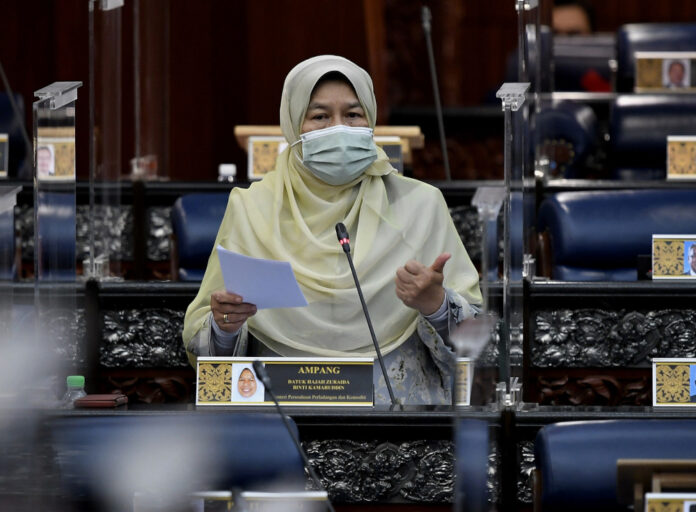Datuk Zuraida Kamaruddin during the winding-up session for the 12th Malaysia Plan in the Dewan Rakyat, October 6, 2021. — Bernama pic
KUALA LUMPUR, Oct 6 — The Ministry of Plantation Industries and Commodities (MPIC) plans to take more aggressive measures to address palm oil-related issues by formulating plans for the marketing and development of the commodity.
Its minister, Datuk Zuraida Kamaruddin, said this was to ensure that the commodity remained competitive in the international market.
Touching on the anti-palm oil campaign, she said it had been running for decades and among the issues being disputed were the health aspect of palm products, environmental impact of oil palm cultivation and, most recently, labour-related issues.
“These issues seem to be raised by the European Union (EU) and the United States (US) on purpose due to market competition and not on actual facts,” she said during the winding-up session for the 12th Malaysia Plan (12MP) in the Dewan Rakyat today.
According to Zuraida, MPIC’s next move is to study and focus marketing efforts in the East, such as China, India, Japan and Uzbekistan, which currently consume high levels of palm oil.
At the same time, she said, her ministry also aimed to reduce the pressure from the EU and the US through engagement with the relevant parties from those countries to provide accurate facts to counter the negative perception of palm oil.
“We will protect our market in the East and grow our share while ensuring the EU and the US do not disrupt the market,” she said.
Touching on the Malaysian Sustainable Palm Oil (MSPO) certification scheme, Zuraida said it was well known that the country’s palm oil industry held high standards and its sustainability was being strengthened for the long term.
“To date, almost 100 per cent of Malaysia’s large plantation companies have obtained the certification while nearly 50 per cent of smallholders have already obtained the MSPO certification.
“Taking into account the problems faced by smallholders, the government will try to formulate policies to help them to obtain the MSPO certification,” she said.
Regarding the shortage of workers in the plantation sector, Zuraida said MPIC had managed to get the approval to bring in 32,000 foreign workers for the plantation sector, including oil palm plantations, especially for harvesting work which was not shunned by locals.
“We are in a hurry to get foreign workers because we want to get 40 per cent of the harvest by the end of this year.
“If the workers could not be brought into the industry, the sector would lose around RM20 billion,” she said.
On the issue of housing and settlement of plantation workers that is often raised by the EU and the US, Zuraida said it was high time for MPIC to develop a policy on plantation workers’ housing so that it would be more organised, with standards that it would need to adhere to.
She said housing for workers at big plantations was in order but for smallholders, it may need to be managed in clusters so it could be more effectively organised and structured.
On the project to plant one million trees or replant forest trees in Sabah, Zuraida said there was a slight delay in the undertaking due to the Covid-19 pandemic.
“However, the appointment of contractors has been carried out and they will start work as soon as possible after obtaining permission from the authorities.
“So far, a total of 10,000 trees have been planted,” she added.
On the Malaysian Palm Oil Green Conservation Fund (MPOGCF), she said it had received a total allocation of RM8.02 million and had spent RM476,078 for project financing.
Among the projects approved by MPOGCF are the One Million Trees Replanting Programme (RM2.26 million), Malayan Tiger Conservation Programme (RM3 million over five years), and Borneo Orangutan and Borneo Elephant Population Survey (RM1.5 million). — AFP


